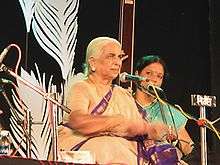Girija Devi
Girija Devi (8 May 1929 – 24 October 2017) was an Indian classical singer of the Seniya and Banaras gharanas. She performed classical and light classical music and helped elevate the profile of thumri. She died on 24 October 2017.
Girija Devi | |
|---|---|
Devi performing in Bharat Bhavan, Bhopal (July 2015) | |
| Background information | |
| Born | 8 May 1929 Benares, Benares State, British India |
| Died | 24 October 2017 (aged 88) Kolkata, West Bengal, India |
| Genres | Hindustani classical music |
| Instruments | vocal |
| Years active | 1949–2017 |
Early life
Girija Devi was born in Varanasi, on 8 May 1929, to Ramdeo Rai, a zamindar.[1] Her father played the harmonium and taught music, and had Girija Devi take lessons in singing khyal and tappa from vocalist and sarangi player Sarju Prasad Misra starting at the age of five.[2] She starred in the movie Yaad rahe aged nine and continued her studies under Sri Chand Misra in a variety of styles.[2]
Performing career

Girija Devi made her public debut in 1949 on All India Radio Allahabad, after marrying a businessman circa 1946, but faced opposition from her mother and grandmother because it was traditionally believed that no upper-class woman should perform publicly.[1][2][3] Girija Devi agreed not to perform privately for others, but gave her first public concert in Bihar in 1951.[2] She studied with Sri Chand Misra until he died in the early 1960s, worked as a faculty member of the ITC Sangeet Research Academy in Kolkata in the 1980s and of the Banaras Hindu University during the early 1990s, and taught several students to preserve her musical heritage.[2] Girija Devi often toured and continued to perform in 2009.[2][4]
Girija Devi sang in the Banaras gharana and performed the purabi ang thumri style typical of the tradition, whose status she helped elevate.[3][5] Her repertoire included the semi-classical genres kajri, chaiti, and holi and she sang khyal, Indian folk music, and tappa.[3][6] The New Grove Dictionary of Music and Musicians once stated that her semi-classical singing combined her classical training with the regional characteristics of the songs of Bihar and eastern Uttar Pradesh.[2]
Awards

- Padma Shri (1972)
- Padma Bhushan (1989)
- Padma Vibhushan (2016)[7]
- Sangeet Natak Akademi Award (1977)
- Sangeet Natak Akademi Fellowship (2010)[8]
- Maha Sangeet Samman Award (2012)[9]
- Sangeet Samman Award ( Dover Lane Music Conference)
- GiMA Awards 2012 (Lifetime Achievement)
- TanaRiri Puraskar
References
- Ramnarayan, Gowri (11 November 2008). "Queen of thumri". The Hindu. Archived from the original on 6 April 2018. Retrieved 11 April 2009.
- Dutta, Amelia (2001). "Devi, Girija". In Sadie, Stanley (ed.). The New Grove dictionary of music and musicians. 7 (2nd ed.). London: Macmillan Publishers. pp. 265–266. ISBN 978-0-333-60800-5.
- Tandon, Aditi (17 February 2004). "Future of folk music uncertain, warns Girija Devi". The Tribune. Retrieved 11 April 2009.
- Trivedi, Sukumar (5 January 2009). "Pandit Hariprasad Chaurasia works a charm with his magic flute". The Indian Express. Retrieved 11 April 2009.
- Dorian, Frederick; Broughton, Simon; Ellingham, Mark; McConnachie, James; Trillo, Richard; Duane, Orla (2000). World Music: The Rough Guide. Rough Guides. p. 91. ISBN 978-1-85828-636-5.
- Kumar, Raj (2003). Essays on Indian music. Discovery Publishing House. ISBN 978-81-7141-719-3.
- "Padma Awards" (PDF). Ministry of Home Affairs, Government of India. 2015. Archived from the original (PDF) on 15 November 2014. Retrieved 21 July 2015.
- "Padma Awards". Ministry of Communications and Information Technology. Archived from the original on 17 February 2012. Retrieved 11 March 2009.
- "Sangeet Natak Akademi Awards – Hindustani Music – Vocal". Sangeet Natak Akademi. Archived from the original on 1 February 2016. Retrieved 29 December 2009.
Further reading
- Mishra, Yatindra (2006). Girija: A Journey Through Thumri. Rupa. ISBN 978-81-291-0857-9.